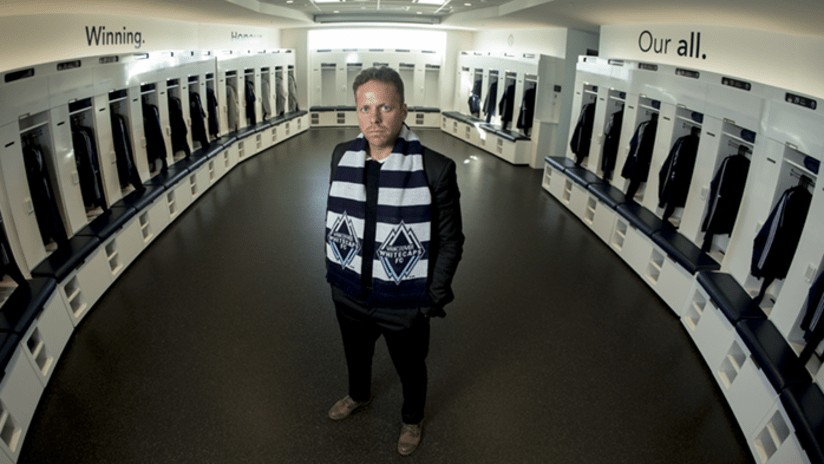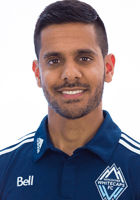VANCOUVER, BC – In February 2012, Marc Dos Santos was hired as a youth academy coordinator for SE Palmeiras – one of the biggest and most successful clubs in Brazilian football.
To say it turned heads would be an understatement.
A Canadian coach working for any club in Brazil – let alone one of this stature – was unheard of. And members of the local media weren’t afraid to share their opinions. One article, for example, sarcastically referred to Canada as a “real soccer powerhouse” and displayed an illustration of a donkey next to a chalkboard with “2+2=3” written on it.
“They destroyed me,” Dos Santos said in a 2016 interview. “I don’t remember the person who wrote the article, but I want to thank him today because it was a fantastic trigger for me to win.”
And win, he did.
That year, as head coach of the U-15s, Dos Santos led Palmeiras to their first-ever Copa do Brasil championship. And it should come as no surprise. Dos Santos has had success at every level he’s coached – both abroad and here in North America.
Notably, he’s won championships in both the USL and NASL – most recently in 2017, when he led the expansion San Francisco Deltas to a Soccer Bowl title despite uncertainty surrounding the franchise’s future (they would eventually fold following the championship match).
It was Dos Santos’ third straight championship final appearance as a head coach. And remarkably, they came with three different teams after runner-up finishes with Swope Park Rangers – also an expansion side – and Ottawa Fury FC the two years prior.
Most recently, Dos Santos worked under Bob Bradley as an assistant coach in 2018, helping LAFC set an MLS record for most points earned by an expansion team in an inaugural season.
And now, he’s determined to win in Vancouver.
“For 12 years, I think I’ve prepared myself to get into this club,” Dos Santos told whitecapsfc.com. “I’ve coached in every level the Vancouver Whitecaps have been. The CSL, the USL, the NASL. I feel like I have that in common with the club. One of the things both me as a coach and the Whitecaps as a club don’t have is an MLS Cup. It’s very exciting now to be united towards a goal like that.”
So what has been the key to Dos Santos’ success as a coach?
To answer that question, you have to go back to the very beginning.
Dos Santos was born in Montreal, Quebec. That’s where he was first exposed to football through his father, who coached semi-professionally. But it wasn’t until Dos Santos moved to Portugal with his family at age nine that his own footballing career took off.
As a player, he came through the youth system at SC Beira-Mar and played professionally in the Portuguese third and fourth tiers, but knew early on that he wanted to get into coaching.
So when he had an opportunity at age 26 to join his boyhood club Boavista FC on a coaching internship, he took it with both hands. It was one of three coaching internships Dos Santos did in Portugal, also working with SC Beira-Mar and Primeira Liga giants FC Porto.
That was the beginning of his coaching education – and it was a pretty good one.
In Portugal, Dos Santos learned from the likes of José Guilherme Oliveira and Vitor Frade, who the New York Times described as “soccer’s most magnificent mind” and “one of sport’s most noteworthy theorists.” Frade is known as the father of “tactical periodization” – a methodology that Dos Santos has since adopted and implemented into his own model of play.
In simplified terms, the concept suggests there are four key segments to a game: offensive organization, defensive organization, offensive transition, and defensive transition, and that every aspect of a team’s preparation should revolve around those segments.
In other words, everything should have a purpose. Every training session. Every drill.
Everything.
“Look at Carlos Santana, I don’t think he plays piano to get better in what he does, he plays a lot of hours of guitar,” Dos Santos told FourFourTwo in 2016. “So if you want to play a certain way, you have to train that certain way. And it’s not enough to go to a board and write it down. Like in music, again, if I show you a YouTube video of a guy playing a guitar but I don’t give you the guitar in your hand, it’s not going to help you. The training session has to reflect that model every day.”
Establishing a model of play is the first step. Getting players to buy in is another.
Dos Santos, who speaks English, French, Portuguese, and Spanish, has been able to do both, connecting with players of all ages from all across the globe.
The 41-year-old has been perfecting his coaching philosophy for more than a decade, having worked on four different continents – including a technical director post with Desportivo Brasil. Like every one of his training sessions, every step of Dos Santos’ journey has had a purpose.
For Dos Santos, it’s all been part of a constant pursuit of knowledge fueled by a burning desire to be the best.
“What I believe is that if a coach doesn’t show that ambition to be the best and to succeed, he can’t really feed his players,” Dos Santos said. “I want the players to feel much how much I want to do well as a coach. And how much that impacts them as players.”
“If they do well, if I do well, if the team has a winning mentality, everybody in the club benefits from that,” he added. “The club, the fans, the players. So I think it’s very important for me always to keep that passion and to keep that winning drive. It’s a natural attitude I have within me.”


